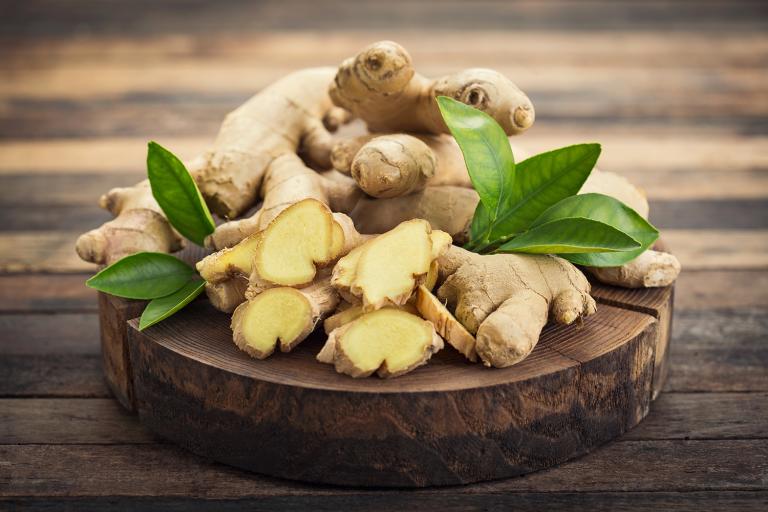“Spicy to the tongue, yet soothing to the digestive tract.”
That's how the late herbalist Steven Foster described the knotty rhizome (or root) that’s been prized for more than 4,000 years.
From its use in breads baked by ancient Greeks to ginger ale and spicy cuisine, ginger (Zingiber officinale) is a popular flavoring.
Chopped or grated, fresh ginger adds terrific taste to stir-fries and other recipes. You’ll want to keep ground ginger on hand for baking too.
But are you aware of its many health benefits?
Health Benefits of Ginger
-
Digestive Aid
Widely used as a digestive aid to relieve an upset tummy, nausea, and vomiting, this is one herb that appears safe enough to use in pregnancy, following surgery, and during chemotherapy.
“Ginger’s rhizomes contain chemicals known as gingerols and shogaols,” wrote Foster.
“They stimulate the flow of saliva, bile, and gastric secretions, quell stomach upsets, and encourage gentle muscle contractions that move food through the digestive tract."
"They are also responsible for ginger’s antinausea effects; they inhibit violent muscle spasms in the digestive tract and curb diarrhea.”
Clinical research also finds this herb effective for motion sickness, so pack a little ginger tea in your suitcase or glove compartment.
-
Anti-Inflammatory
Ginger’s pungent components offer powerful anti-inflammatory and antioxidant activities, making it useful in arthritis and potentially in Alzheimer’s, cancer, and cardiovascular disease.
-
Ginger Extract
Ginger extract has long been used in herbal medicine to decrease inflammation. One recent research review confirms ginger’s effectiveness for chronic low back and osteoarthritis pain.
The active compound responsible for this effect is zingibain, an enzyme that counteracts inflammation. Just one gram of zingibain in powdered ginger will tenderize up to 20 pounds of meat.
-
Fresh Ginger Root
Don’t overlook the power of fresh ginger, though.
In a two-year Indian experiment, people with osteoarthritis and rheumatoid arthritis experienced some relief from joint pain—with no side effects—after taking 3 to 7 grams of fresh root every day.
In other research, powdered ginger relieved pain in more than 75 percent of the study participants.
-
-
Ginger and Immunity
The powerful antioxidants found in ginger promote healthy cell growth and attack unhealthy cells. Ginger contains vitamin C and zinc; both support the immune system’s white blood cells.
-
Other Uses
-
Cardiovascular Health
Ginger shows real promise in preventing blood platelets from clumping, helping to fight heart disease and stroke.
-
Brain Health
Research suggests this root may protect nerve cells in the brain, potentially preventing Alzheimer’s disease.
-
For Diabetes
This herb has a thermogenic effect (helping to boost metabolic rate), so it’s no wonder research has focused on its antidiabetic benefits.
Not only does ginger lower insulin levels significantly in animal studies, but it also helps lower blood pressure, cholesterol, and triglyceride levels.
It may even help prevent the many complications of diabetes.
-
For Cancer
With antioxidant and antimutagenic properties, ginger also inhibits the development of cancer.
Recent research points to specific protection against colon and ultraviolet B-related skin cancers.
-
Gut Health
Ginger’s phenol compounds help fight H. pylori, possibly preventing ulcers.
-
Selecting and Using Ginger
Add ginger at the beginning of cooking for subtle flavor or near the end for more pungency.
Ginger can also be used as an addition to fresh fruit and vegetable juices or made into tea—steep one to two half-inch slices of fresh ginger in a cup of hot water.
Forms of Ginger
You’ll find ginger in a variety of forms at your local market. When choosing ginger, keep the following tips in mind:
-
Whole Root
Whole fresh roots provide the freshest taste. Fresh ginger root is most widely available with a tough skin that requires peeling.
Choose a root with no signs of decay (spots, mildew, or dry, wrinkled skin) and make sure it’s firm and smooth.
Store unpeeled ginger in the refrigerator for up to three weeks.
-
Powdered
Powdered ginger is a ground spice made from the dried root. Choose organic ginger if it’s available.
Keep it in a tightly sealed glass container in a cool, dark, dry place for up to six months.
-
Crystallized
Crystallized ginger is cooked in sugar syrup and then air-dried and rolled in sugar. Crystallized ginger is a convenient, easily portable, kid-friendly remedy for car sickness or upset stomach.

